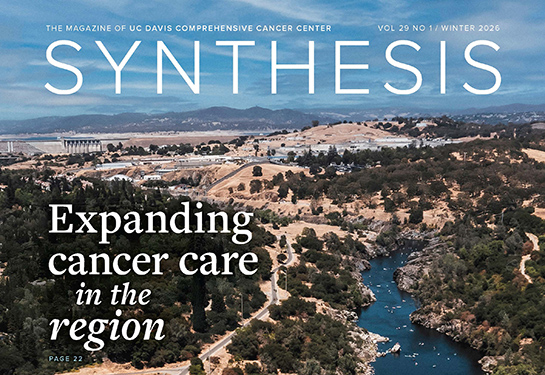‘UC Quits’ project helps patients stop smoking
New study across all five UC health systems shows electronic referrals to quitlines help patients give up tobacco
A new University of California study shows long-term success when health care providers make electronic referrals (e-referrals) for their patients to California’s tobacco quitline. The paper was published today in the journal Nicotine & Tobacco Research.
Quitlines offer free help to stop tobacco use. They typically double the chances that a person stays quit for good.
Tobacco is the leading cause of preventable disease, disability and death in the United States. Quitting significantly reduces these risks. However, until this study was conducted, there had been little research about the real-world implementation, maintenance, and outcomes of e-referrals to quitlines. The study is the first collaboration of its kind to be conducted by all five University of California health systems.
“Even though the five UC health systems are under the umbrella of UC Health, they each are independent, which is why the implementation benefited from a whole-systems approach, taking into account the different IT systems and clinical workflows,” said Elisa Tong, lead author of the study and UC Davis co-leader of CA Quits.
Tong is also an internist and medical director of the Stop Tobacco Program at UC Davis Health. She said that including both outpatient and inpatient settings is important for offering and sustaining e-referrals to patients. The study showed that patients referred by providers had similar quit rates as people who called the quitline seeking help.
Method and results
In 2013, UC Davis Health was the first health system to implement an e-referral to the California quitline, now known as Kick it California. Beginning in 2014, the UC-wide project UC Quits worked with inpatient, outpatient, and nursing champions to scale up quitline e-referrals from one to five UC health systems. This also included UC San Francisco, UC Irvine, UC Los Angeles, and UC San Diego.
Data on e-referred patients and quitline callers were collected April 2014-March 2021. Analysis of referral trends and cessation outcomes was conducted in 2021-2022.
Of the more than 20,000 patients referred, the quitline contacted 47.1%; 20.6% of those completed the intake process. Data collected showed 15.2% requested counseling and 10.9% received the cessation help. In a sample randomly selected for follow-up, patients e-referred by their UC providers were as likely as general quitline callers to attempt quitting (68.5% vs. 71.4%), quit for 30 days (28.3% vs. 26.9%) and quit for six months (13.6% vs. 13.9%).
The study supports the broad implementation of tobacco quitline e-referrals across health care settings and finds that modifying electronic health records systems and clinical workflows will enable and encourage e-referrals.
If implemented and maintained appropriately, the study showed that e-referrals will improve patient care, make it easier for clinicians to support patients in quitting, and increase the number of patients using evidence-based treatment.
“More health systems can use electronic referral systems to link with the quitline and collaborate on systems changes,” said Shu-Hong Zhu, UC San Diego leader of Kick it California and co-author. “Establishing and maintaining electronic referrals is an important way to ensure patients who are trying to stop smoking are set up for success.”
Acknowledgements
Other authors included Shu-Hong Zhu, Christopher M. Anderson, Mark V. Avdalovic, Alpesh N. Amin, Allison L. Diamant, Timothy W. Fong, Brian Clay, Robert El-Kareh, Sujatha Sankaran, Catherine Bonniot, Carrie A. Kirby, Antonio Mayoral, and Linda Sarna.
Funding was supported by the UC Center for Health Quality and Innovation, with additional support secured from Tong from the Tobacco-Related Disease Research Program (#28CP-0039HS). Kick It California is funded by the California Department of Public Health, First 5 California and the Centers for Disease Control and Prevention.
UC Davis Comprehensive Cancer Center
UC Davis Comprehensive Cancer Center is the only National Cancer Institute-designated center serving the Central Valley and inland Northern California, a region of more than 6 million people. Its specialists provide compassionate, comprehensive care for more than 100,000 adults and children every year and access to more than 200 active clinical trials at any given time. Its innovative research program engages more than 240 scientists at UC Davis who work collaboratively to advance discovery of new tools to diagnose and treat cancer. Patients have access to leading-edge care, including immunotherapy and other targeted treatments. Its Office of Community Outreach and Engagement addresses disparities in cancer outcomes across diverse populations, and the cancer center provides comprehensive education and workforce development programs for the next generation of clinicians and scientists. For more information, visit cancer.ucdavis.edu.




